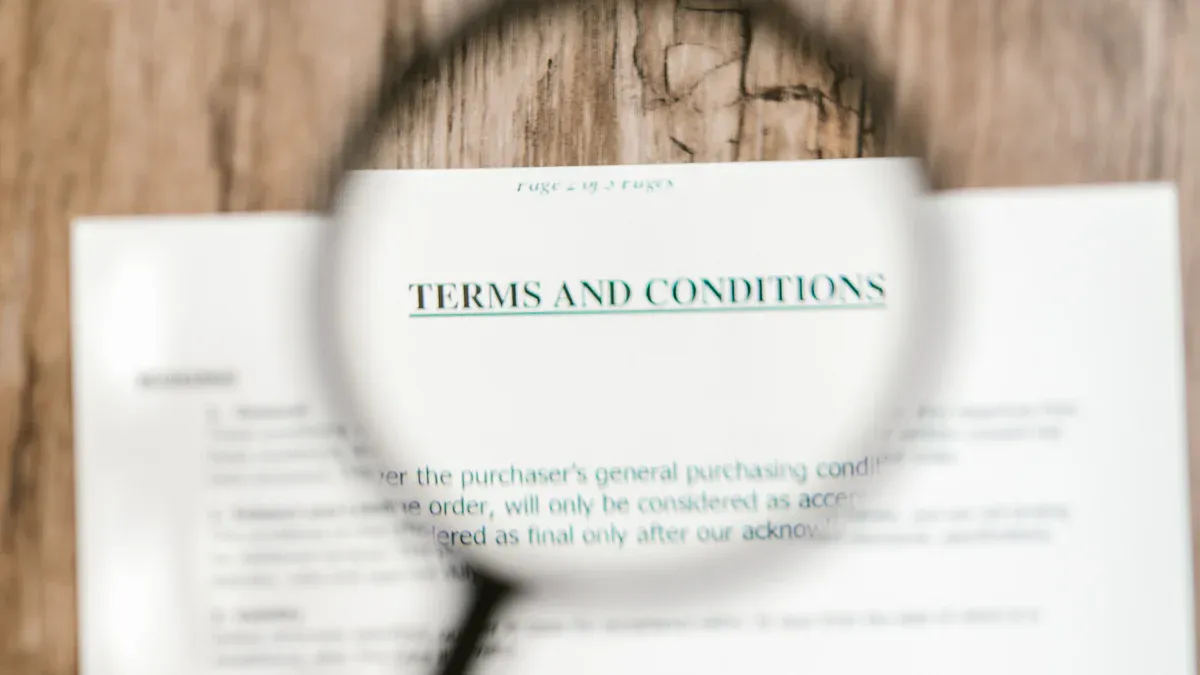Image Source: pexels
Breaking a lease can seem scary, but renters have rights. Understanding these rights is crucial for navigating the situation effectively. By following the proper steps outlined in "Tenant Rights: How to Break a Lease Legally Without Penalties," individuals can terminate their lease legally. This approach helps them avoid penalties and resolve issues fairly, making the process less stressful for everyone involved.
Tip: Learn your tenant rights to end your lease easily.
Key Takeaways
- Learn your rights as a tenant to end a lease legally. This helps you avoid fees and solve problems fairly.
- Write down all talks with your landlord. Keeping notes can protect you and help if there are arguments.
- Check legal reasons to break a lease, like unsafe housing or military duty. Knowing these lets you act with confidence.
Legal Reasons for Breaking a Lease Without Penalties
Ending a lease can feel stressful, but some legal reasons let tenants do it without penalties. Knowing these reasons helps renters act confidently and protect their rights.
Unlivable Housing Conditions
Landlords must give tenants safe and livable homes. If a rental becomes unsafe, tenants might break their lease. Common problems include:
- Roof or door leaks
- No hot or cold water
- Broken toilets or sinks
- Mold or pests
For instance, a tenant with no heat in winter or a bad pest issue could legally leave. These problems break the rule that homes must be safe to live in.
Landlord Breaking Lease Rules
Landlords must follow the lease and respect tenants’ rights. If they enter without notice or ignore big repairs, tenants may leave. For example, not fixing smoke alarms or providing water can let tenants break the lease. These actions harm trust between landlords and tenants.
Military Service Rights
The Servicemembers Civil Relief Act (SCRA) helps active-duty military members. It lets them end leases if signed before duty or when deployed for 90+ days. They must give written notice and deployment orders. This law helps military members focus on their service.
Domestic Violence Protections
Many states protect tenants facing domestic violence. Survivors can leave unsafe homes by breaking their lease. They may need proof, like a restraining order, to use this right. These laws aim to keep tenants safe.
State-Specific Tenant Laws
Tenant laws differ by state. Some states allow lease breaks for medical issues or job moves. Tenants should check local laws to know their rights. Understanding these laws makes ending a lease easier and less stressful.
Tip: Always keep records and talk clearly with your landlord to support your case.
Steps to Take When Breaking a Lease

Image Source: pexels
Breaking a lease can feel hard, but steps can help. By being prepared, tenants can protect themselves and avoid problems.
Check the Lease for Early End Rules
Start by reading your lease carefully. Many leases explain how to end them early without trouble. Follow these steps to check:
- Look for rules about ending the lease, notice times, and fees.
- Tell your landlord you want to leave and suggest a date.
- Follow the notice time in the lease, usually 30 to 90 days.
- Think about subletting, paying to end the lease, or other options.
- Talk with your landlord if no clear rules are listed.
- Write down all agreements to avoid confusion later.
These steps help make things clear and avoid fights.
Send a Written Notice to Your Landlord
A written notice is very important when leaving a lease. It’s proof you told your landlord and protects you legally. Include these details:
- A reason for leaving, like unsafe housing or legal rights.
- Mention any laws or lease rules that apply.
- The date you plan to move out and follow the notice time.
- Keep paying rent until the lease officially ends.
Send the notice by email or certified mail to have proof it was sent.
Work Out an Agreement with Your Landlord
Talking with your landlord can help both sides agree. Try these ideas:
- Learn about the rental market and what your landlord needs.
- Be friendly to build trust with your landlord.
- Use your good rental history to help your case.
- Offer to help, like paying for ads to find a new renter.
- Write down all deals to avoid problems later.
Good talks can help you leave without paying extra fees.
Sublet or Transfer the Lease (If Allowed)
Subletting or transferring the lease can work if the lease allows it. State rules are different, so check your local laws. For example:
| State | Rule |
|---|---|
| California | Subletting is okay unless the lease says no; landlord must agree in writing. |
| Texas | Subletting is not allowed without landlord approval. |
| Virginia | Landlords must reply to sublet requests in 10 days; no reply means approval. |
| New York | Written landlord approval is needed, with details in the request. |
Knowing these rules helps tenants follow the law.
Save All Papers for Safety
Keep all papers when breaking a lease. Save notices, emails, and agreements. These can help if there are problems later and protect you legally.
By following these steps, tenants can handle the process easily and protect their rights.
Consequences of Breaking a Lease and How to Reduce Them
Breaking a lease can be tough, but knowing the effects helps. Tenants can prepare and lower risks by understanding what might happen.
Money Problems and Losing Security Deposits
Ending a lease early can cost tenants money. Common costs include:
- Paying a fee equal to one or two months’ rent.
- Paying rent until the lease ends or a new tenant moves in.
- Losing the security deposit for damages or unpaid rent.
To lower these costs, talk to your landlord and find solutions. Options like subletting or making a deal can help. Keeping the home clean and undamaged helps get the deposit back.
Hurting Credit Scores and Rental Records
Breaking a lease can hurt credit scores if debts go unpaid. If sent to collections, it stays on credit reports for seven years. This makes renting harder in the future. To avoid this, pay all fees and stay in touch with your landlord. Finding someone to take over the lease can also help protect your rental record.
Stopping Legal Problems with Good Communication
Talking clearly can stop legal problems. Tenants should send written notices and keep records of all agreements. Being kind and giving updates can build trust with landlords. This makes moving out easier for everyone.
Getting Help from Lawyers or Tenant Groups
If problems arise, tenants can ask lawyers or tenant groups for help. These experts explain tenant rights and give advice on breaking leases legally. They help tenants make smart choices and stay protected.
By knowing these risks and acting wisely, tenants can handle the process better and avoid big problems.
You can break a lease legally if you know your rights. Important points to remember:
- Make sure the home is safe to live in.
- Use your rights if you’re in the military or face domestic violence.
- Report landlord issues, like entering without permission.
Talk clearly with your landlord and keep records of everything. Ask for help from tenant groups or lawyers if needed. Staying informed and acting early can help you avoid problems and protect your money and rights.
FAQ
What happens if a tenant breaks a lease without legal reasons?
Landlords might charge fees or keep the security deposit. They could also report unpaid rent, which hurts credit scores and rental history. Always read your lease carefully before deciding.
Can a tenant break a lease because of job relocation?
Some states let tenants end leases for job moves. Check your state’s laws and give written proof of your relocation to the landlord.
How can tenants avoid penalties when breaking a lease?
Tenants can avoid penalties by working out deals with landlords. They can sublet (if allowed) or use legal reasons like unsafe housing. Good communication and keeping records are very important.
Tip: Check your local tenant laws for extra protections. 🏠
